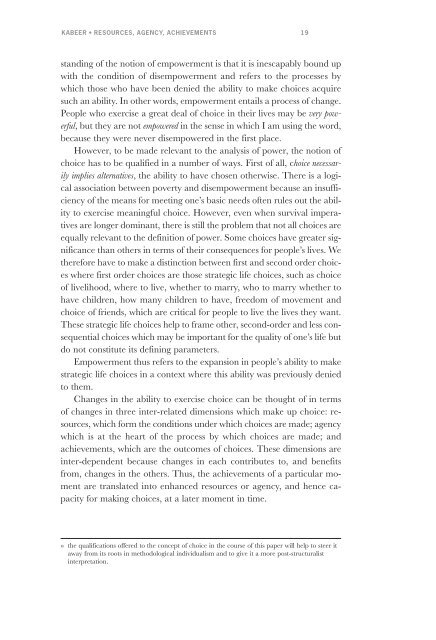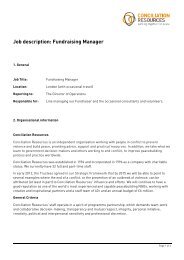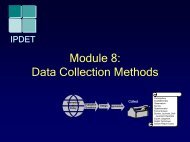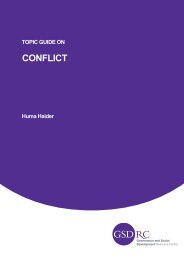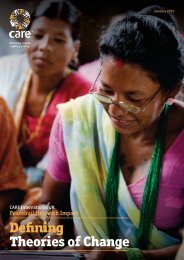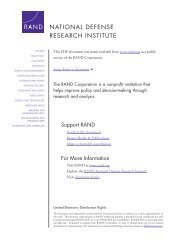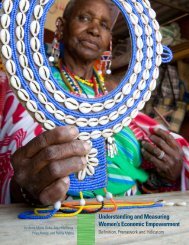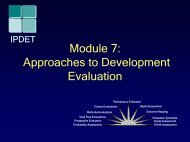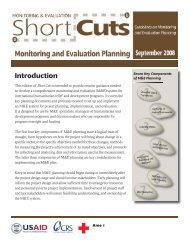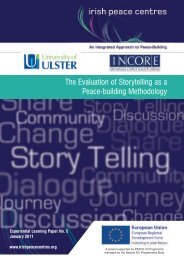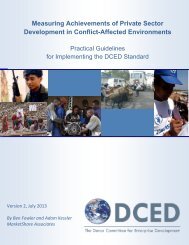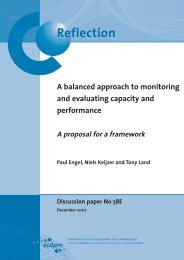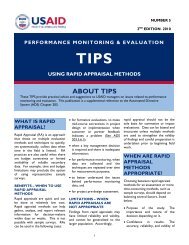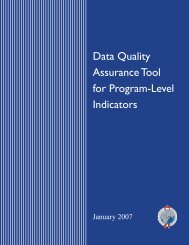Discussing Women's Empowerment - Sida
Discussing Women's Empowerment - Sida
Discussing Women's Empowerment - Sida
You also want an ePaper? Increase the reach of your titles
YUMPU automatically turns print PDFs into web optimized ePapers that Google loves.
KABEER • RESOURCES, AGENCY, ACHIEVEMENTS 19<br />
standing of the notion of empowerment is that it is inescapably bound up<br />
with the condition of disempowerment and refers to the processes by<br />
which those who have been denied the ability to make choices acquire<br />
such an ability. In other words, empowerment entails a process of change.<br />
People who exercise a great deal of choice in their lives may be very powerful,<br />
but they are not empowered in the sense in which I am using the word,<br />
because they were never disempowered in the first place.<br />
However, to be made relevant to the analysis of power, the notion of<br />
choice has to be qualified in a number of ways. First of all, choice necessarily<br />
implies alternatives, the ability to have chosen otherwise. There is a logical<br />
association between poverty and disempowerment because an insufficiency<br />
of the means for meeting one’s basic needs often rules out the ability<br />
to exercise meaningful choice. However, even when survival imperatives<br />
are longer dominant, there is still the problem that not all choices are<br />
equally relevant to the definition of power. Some choices have greater significance<br />
than others in terms of their consequences for people’s lives. We<br />
therefore have to make a distinction between first and second order choices<br />
where first order choices are those strategic life choices, such as choice<br />
of livelihood, where to live, whether to marry, who to marry whether to<br />
have children, how many children to have, freedom of movement and<br />
choice of friends, which are critical for people to live the lives they want.<br />
These strategic life choices help to frame other, second-order and less consequential<br />
choices which may be important for the quality of one’s life but<br />
do not constitute its defining parameters.<br />
<strong>Empowerment</strong> thus refers to the expansion in people’s ability to make<br />
strategic life choices in a context where this ability was previously denied<br />
to them.<br />
Changes in the ability to exercise choice can be thought of in terms<br />
of changes in three inter-related dimensions which make up choice: resources,<br />
which form the conditions under which choices are made; agency<br />
which is at the heart of the process by which choices are made; and<br />
achievements, which are the outcomes of choices. These dimensions are<br />
inter-dependent because changes in each contributes to, and benefits<br />
from, changes in the others. Thus, the achievements of a particular moment<br />
are translated into enhanced resources or agency, and hence capacity<br />
for making choices, at a later moment in time.<br />
» the qualifications offered to the concept of choice in the course of this paper will help to steer it<br />
away from its roots in methodological individualism and to give it a more post-structuralist<br />
interpretation.


